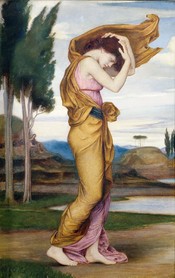The Women of Trachis
In Sophocles' time, feminism was not a concept that existed. The Greek playwright penned most of his works in the mid-400 BC period; men seemed to be considered the only gender, while women were relegated to being nonentities in that world. However, a strong female character takes center stage in The Women of Trachis, also published as The Trachiniae. Deianira, wife of Heracles, tells her story aided by her friends, the aforementioned Women of Trachis, and manages to become a martyr for scorned women everywhere. The combination of willfulness and assertiveness the women display is completely uncharacteristic of females of that time, and illustrates a portrait of women that sets standards for the earliest study of feminism on Greek stage.
The wife of Heracles, Deianira stoically bears the heavy burden that her husband's disappearance has laid on her throughout the majority of the first act.
Her initial role is that of the stereotypical "woman in peril", wringing her hands while intoning such lines as "I only know he's gone and left me with a sharp pain for him" (line 42) and "his ruin is ours" (85). Her role seems to be written as a supporting character for Heracles' heroic escapades; the reader initially presumes that Deianira's moral fiber is going to be constructed on the stereotypes of her gender. However, evidence is shown within the text later on in the tale that contradicts every expectation of her character's role in Heracles' exploits. Pages after Deianira begins to mourn her missing husband, she learns of his taking of a mistress from amongst a pool of women he has made captive. From then on, she establishes herself as a woman to be reckoned with, and her chorus does not fail her.
"Damn all scoundrels, but...


